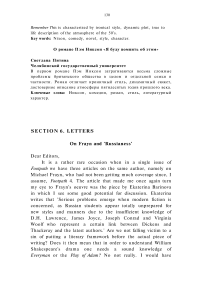On Frayn and ''Russianess''
Автор: Saveliev Sergey V.
Журнал: Тропа. Современная британская литература в российских вузах @footpath
Рубрика: Letters
Статья в выпуске: 9, 2015 года.
Бесплатный доступ
Короткий адрес: https://sciup.org/147231037
IDR: 147231037
Текст статьи On Frayn and ''Russianess''
Dear Editors,
It is a rather rare occasion when in a single issue of Footpath we have three articles on the same author, namely on Michael Frayn, who had not been getting much coverage since, I assume, Footpath 4. The article that made me once again turn my eye to Frayn's oeuvre was the piece by Ekaterina Barinova in which I see some good potential for discussion. Ekaterina writes that 'Serious problems emerge when modern fiction is concerned, as Russian students appear totally unprepared for new styles and manners due to the insufficient knowledge of D.H. Lawrence, James Joyce, Joseph Conrad and Virginia Woolf who represent a certain link between Dickens and Thackeray and the latest authors.' Are we not falling victim to a sin of putting a literary framework before the actual piece of writing? Does it then mean that in order to understand William Shakespeare's drama one needs a sound knowledge of Everyman or the Play of Adam? No not really. I would have agreed if it had been the case of David Lodge's campus novels where you will simply miss certain inside jokes, unless you are majoring in English Literature. There is nothing wrong with looking at a novel, poem or theater piece in context, yet this path might be too slippery at times. I assume that this is the case with Frayn being 'Russian'. Indeed, the training which Frayn received at Joint Services School for Linguists did give him not only a profound knowledge of written and spoken Russian but also a love and understanding of Russian literature, but it is equally true of Alan Bennett, Dennis Potter and D.M. Thomas as well as many others. Thus it is rather an argument for the approach to teaching culture, taken at JSSL. Taking the 'Russian' stance we get a very distorted vision of Frayn as a novelist and playwright. I would view Frayn's overtly Russian spy novel The Russian Interpreter as a kind of touchstone, especially if we put it context: preceded by the satirical novel The Tin Men and followed by a semi-autobiographical newspaper novel Towards the End of the Morning.
I would have also been more careful in searching for "Soviet" allusions in Headlong, as Stalin, Beria, Trotsky are in a sense epitomes of a Communist dictatorship as well as Himmler and Seyss-Inquart of its Nazi counterpart. In a similar fashion we could have lined up Copenhagen, Spies and Headlong, and claim that Frayn finds the darker pages of German history of particular interest. Frayn's translation As for the students finding Frayn 'so Russian', well could it just be that they are simply quite profound readers of English Literature able to understand subtler tones and ironies?
Sergey V. Saveliev
State University of Humanities and Social Studies, Kolomna


